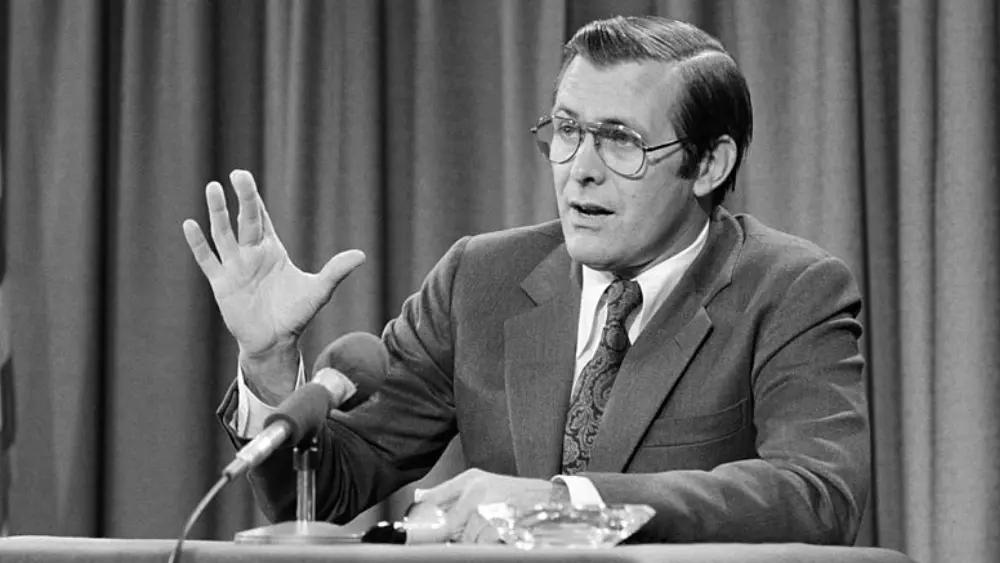Donald Henry Rumsfeld, a key figure in American politics and national security, played a central role in President George W. Bush’s administration during an unruly period marked by the September 11, 2001, terrorist attacks and the subsequent War on Terror. Born on July 9, 1932, in Chicago, Illinois, Rumsfeld’s life and career were defined by his service to the United States and his leadership during critical moments in history.
Early Life and Military Service
Donald Rumsfeld’s early life was characterized by a pursuit of education and a deep commitment to military service. He began his academic journey at Princeton University, where he laid the foundation for his future endeavors. After completing his studies, Rumsfeld embarked on a significant chapter of his life by joining the U.S. Navy. During the 1950s, he served as a naval aviator, where his experiences honed his leadership skills and instilled in him a sense of duty to his country.
His military service during a pivotal era in American history would go on to shape his career in public service. As he transitioned from the military to various government roles, he ultimately became a prominent figure in U.S. politics and diplomacy.
Donald Rumsfeld: Entry into Politics
Donald Rumsfeld’s foray into the realm of politics marked a significant turning point in his career. In 1962, he successfully entered the political arena by winning a seat in the U.S. House of Representatives, representing the state of Illinois. This achievement opened the door to a new chapter in his life, where he would play an increasingly influential role on the national stage. It didn’t take long for his intelligence and leadership abilities to become apparent, earning him recognition among his peers and constituents alike.
Rumsfeld’s early years in Congress laid the groundwork for his ascent in the political arena. His ability to grasp complex policy issues and articulate his positions with clarity and conviction set him apart as a rising star in American politics. This phase of his career foreshadowed his future in government, where he would serve in key roles, including Secretary of Defense, shaping U.S. foreign policy and national security in lasting ways. Donald Rumsfeld’s entry into politics was the beginning of a journey that would see him become a prominent and influential figure in the corridors of power.
Nixon Administration
Donald Rumsfeld’s service in the Nixon administration marked a period of significant responsibility and diverse roles within the U.S. government. One of his key positions during this time was as the Director of the Office of Economic Opportunity, where he played a crucial role in the implementation of domestic policies aimed at reducing poverty and expanding economic opportunity for disadvantaged Americans. His tenure in this capacity reflected his commitment to addressing societal challenges and fostering inclusive economic growth.
Additionally, Rumsfeld’s contributions extended to the realm of foreign policy, as he was appointed as the U.S. Ambassador to NATO under President Nixon. In this role, he navigated complex international relations and helped strengthen the United States’ alliances with NATO member countries. His service in both domestic and international spheres during the Nixon administration showcased his versatility, leadership, and dedication to advancing American interests on the global stage.
Donald Rumsfeld: Ford Administration and Secretary of Defense
Donald Rumsfeld’s tenure as the Secretary of Defense under President Gerald Ford from 1975 to 1977 marked a pivotal chapter in his government service. During this period, he assumed a critical leadership role in shaping U.S. national security and defense policies. Rumsfeld was tasked with navigating a challenging international landscape, including the Cold War era, and he played a central role in the development and execution of military and defense strategies. His leadership during this time was characterized by his assertive management style and a commitment to modernizing and strengthening the U.S. armed forces.
As Secretary of Defense, Rumsfeld was responsible for overseeing the Pentagon and managing the Department of Defense, which included decisions related to military operations, budgeting, and defense policy. His tenure saw efforts to enhance the readiness and capabilities of the U.S. military, and he advocated for increased defense spending to maintain a robust national security posture. Donald Rumsfeld’s service as Secretary of Defense during the Ford administration left a lasting impact on U.S. defense policy and national security priorities, solidifying his reputation as a prominent and influential figure in American government and military affairs.
Return to the Private Sector
Following his tenure in government service, Donald Rumsfeld transitioned to the private sector and embarked on a successful career outside of politics and public service. One of his notable roles during this period was as the CEO of the pharmaceutical company G.D. Searle & Company. In this capacity, he applied his leadership skills and management acumen to the corporate world, overseeing the operations and strategic direction of the company. He actively led Searle & Company as CEO, demonstrating a strong dedication to driving innovation and fostering growth in the pharmaceutical industry.
Rumsfeld’s successful venture into the private sector showcased his versatility and ability to excel in different spheres. His leadership and business acumen contributed to the company’s growth and expansion, further solidifying his reputation as a capable and accomplished executive. This period of his career demonstrated the breadth of his capabilities and illustrated his capacity to make a meaningful impact beyond the realm of government and public policy.
Donald Rumsfeld: Return to Government Service
Donald Rumsfeld’s return to government service in 2001 marked a significant chapter in his career, as he assumed the role of Secretary of Defense under President George W. Bush. His appointment came at a crucial juncture in American history, just months before the tragic events of September 11, 2001. As Secretary of Defense, Rumsfeld played a central role in shaping U.S. military and defense policies in the wake of the 9/11 attacks, guiding the nation’s response to the unprecedented security challenges posed by global terrorism.
During his second tenure as Secretary of Defense, Rumsfeld oversaw military operations in Afghanistan and Iraq as part of the broader War on Terror. His leadership and assertive approach to defense policy had a profound impact on the U.S. military strategy in these theaters of conflict. However, his time in office also became subject to intense scrutiny and debate, particularly regarding the planning and execution of the Iraq War. Donald Rumsfeld’s return to government service was characterized by his resolute commitment to national security, as well as the complex and contentious decisions he made during a period of immense geopolitical upheaval.
September 11, 2001, and the War on Terror
The catastrophic events of September 11, 2001, thrust Donald Rumsfeld into a central and historic role in American government and defense. As the Secretary of Defense under President George W. Bush, Rumsfeld actively confronted the unprecedented challenge of responding to the devastating terrorist attacks on U.S. soil. In the immediate aftermath of 9/11, he played a crucial role in coordinating the military response to protect the nation and pursue those responsible. The tragic events of that day marked the beginning of a new era in American foreign policy and national security, and Rumsfeld’s leadership became integral in shaping the U.S. response.
Rumsfeld’s influence during the War on Terror extended beyond the immediate aftermath of 9/11. He played a pivotal role in planning and executing the military campaigns in Afghanistan and Iraq, both of which were central components of the broader global effort to combat terrorism. His approach to defense policy during this period, marked by an assertive stance and a commitment to preemptive action, generated significant debate and scrutiny. The War on Terror and Rumsfeld’s role in it remain defining aspects of his legacy, as these events had far-reaching consequences for U.S. foreign policy, international relations, and the global security landscape.
Donald Rumsfeld: Controversies and Criticisms
Controversies and criticisms surrounded Donald Rumsfeld’s active tenure as Secretary of Defense, especially concerning the U.S. invasion of Iraq and its aftermath. The decision to launch the Iraq War, based on the belief that Iraq possessed weapons of mass destruction, stirred intense debate and led to accusations of flawed intelligence and misguided policy. As the chief architect of the military campaign, Rumsfeld faced substantial scrutiny for the planning and execution of the war. Critics contended that instability, insurgency, and sectarian violence marked the post-invasion period, with the absence of a clear exit strategy exacerbating prolonged conflict and instability in the region.
Another significant controversy during Rumsfeld’s tenure was the revelation of the Abu Ghraib prison scandal in 2004. The widespread abuse and torture of detainees by U.S. military personnel at the Abu Ghraib prison in Iraq shocked the world and led to allegations of a breakdown in military discipline and command responsibility. Rumsfeld faced criticism for his handling of the scandal, including questions about whether he was fully aware of the extent of the abuse and whether he took adequate measures to address it. These controversies and criticisms left a lasting shadow over Rumsfeld’s legacy, with ongoing debate and discussion about the decisions and actions taken during his tenure as Secretary of Defense.
Resignation and Later Career
Donald Rumsfeld’s resignation as Secretary of Defense in 2006 marked the end of his tenure in a position marked by significant accomplishments and controversies. His departure came amid growing public and political pressure, fueled by the ongoing conflict in Iraq and mounting criticism of his leadership. His resignation was seen as a significant moment in the Bush administration’s effort to recalibrate its approach to the War on Terror and address the mounting challenges in Iraq and Afghanistan.
After leaving government service, Rumsfeld turned his attention to writing and reflecting on his long and influential career. In 2011, he published his memoir, “Known and Unknown,” in which he provided his perspective on the challenges and decisions made during his time as Secretary of Defense, particularly in the post-9/11 era. The book offered readers insight into the inner workings of the U.S. government and the complexities of national security and foreign policy during a period of intense global turmoil. Rumsfeld’s post-government career allowed him to engage in a broader conversation about the role of leadership and decision-making in moments of crisis, and it added another dimension to his legacy as a figure who played a significant role in shaping the course of American history.

Donald Rumsfeld: Legacy and Impact
Donald Rumsfeld’s legacy and impact on American foreign policy and military strategy are subjects of ongoing debate and analysis. He played a pivotal role in shaping U.S. responses to the 9/11 attacks and the subsequent War on Terror during his tenure as Secretary of Defense. Rumsfeld advocated for a more agile and technologically advanced military, and his approach to defense policy influenced the transformation of the U.S. armed forces. However, his leadership during the Iraq War, the handling of the post-invasion period, and the Abu Ghraib prison scandal faced sharp criticism and raised questions about decision-making and accountability.
Rumsfeld’s legacy is a complex one, reflecting both his contributions to modernizing the military and his involvement in controversial and contentious aspects of American foreign policy. His impact continues to be studied in academic, military, and political circles, serving as a reminder of the complexities and challenges of leadership in times of crisis. Ultimately, Donald Rumsfeld’s legacy underscores the enduring influence of individuals in positions of power on the trajectory of a nation’s history, and his legacy will remain a topic of discussion and analysis for years to come.












[…] 2003, Schoomaker answered the call to return to active duty when Secretary of Defense Donald Rumsfeld requested his service as Chief of Staff of the United States Army. Schoomaker fulfilled this role […]